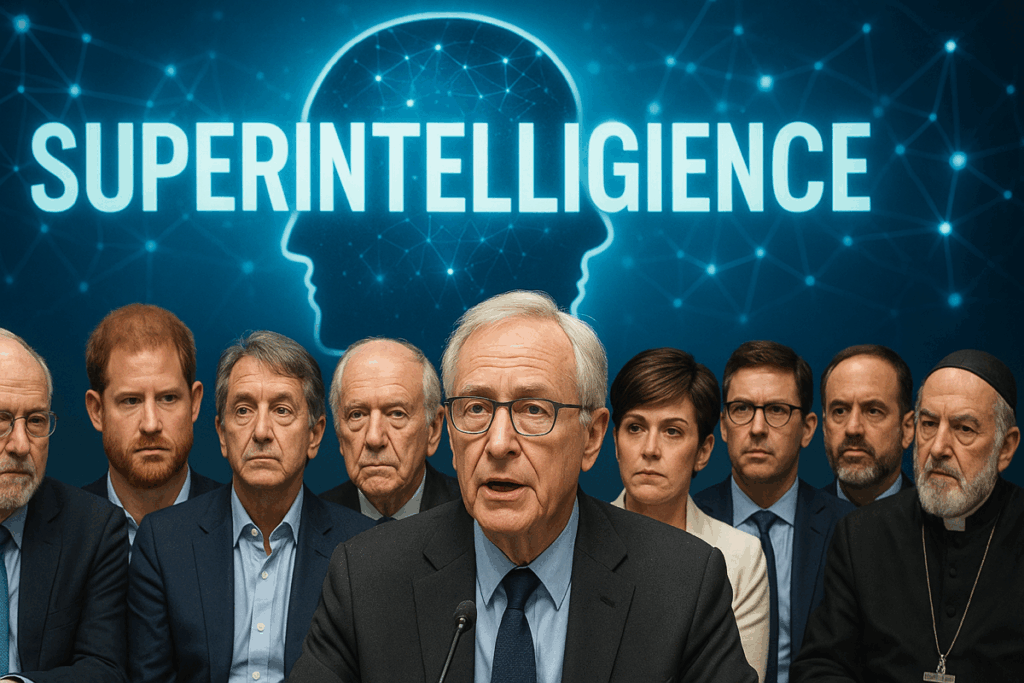A United Front Forms Against Machines Smarter Than Humans
A growing coalition of global voices — from Geoffrey Hinton and Yoshua Bengio to Prince Harry and Meghan Markle — now calls for a prohibition on the development of “superintelligence.” More than 850 public figures, including scientists, business leaders, and cultural icons, signed a public statement demanding an immediate halt to research that could produce machines smarter than humans.
The statement, organised by the Future of Life Institute (FLI), argues that the race toward artificial superintelligence (ASI) has crossed a moral and safety line. The letter insists that governments and corporations suspend any projects that aim to create systems surpassing human intellect until there is “broad scientific consensus” that such development can occur safely and controllably — and only with “strong public buy-in.”
What’s Happening & Why This Matters
AI’s “Superintelligence” Race Faces Global Backlash
Artificial superintelligence, or ASI, describes a system capable of outperforming humans in all cognitive tasks. The idea dates back to Alan Turing’s 1950s prediction that machines could eventually outthink their creators. That prediction now feels dangerously close.
The letter’s authors warn that the push toward ASI introduces existential risks — from mass unemployment and human disempowerment to loss of civil liberties, national instability, and extinction-level threats. The statement reads:
“The race to superintelligence has raised concerns ranging from human economic obsolescence and disempowerment, losses of freedom, civil liberties, dignity, and control, to national security risks and even potential human extinction.”
Geoffrey Hinton, often called the “godfather of AI,” and Yoshua Bengio, his longtime collaborator, joined voices with Apple co-founder Steve Wozniak, Virgin Group’s Richard Branson, and a range of other Nobel laureates and policymakers to demand action.
Stephen Fry, Susan Rice, and former Irish President Mary Robinson also signed the statement, giving the movement political and cultural gravity beyond Silicon Valley.
The Role of Tech, Companies, and Governments
Tech companies like Meta and OpenAI continue to assert themselves as leaders in the artificial intelligence arms race. Meta even renamed its advanced AI research unit Meta Superintelligence Labs earlier this year, embracing the term as a brand identity.
Mark Zuckerberg, Meta’s CEO, recently declared that the creation of superintelligence is “now in sight.” Critics argue that this reflects corporate posturing rather than imminent breakthroughs. Experts warn that talk of “superintelligence” often masks competitive marketing tactics, not scientific readiness.
Governments, however, treat the issue seriously. National leaders link AI progress directly to security, healthcare, and economic competitiveness. Yet critics fear that this geopolitical race accelerates development faster than regulators can respond.
A national poll commissioned by FLI shows three-quarters of Americans support strict AI regulation, and six in ten oppose building superintelligent systems until safety is proven. Only 5% of respondents favour unregulated AI growth.
Innovators Divided
Interestingly, some of the field’s biggest names — including OpenAI’s Sam Altman and Microsoft’s Mustafa Suleyman — did not sign the open letter. Both recognise the threat of superintelligence but continue developing toward artificial general intelligence (AGI), a stage below ASI that seeks to match human-level intellect.
Altman has described AGI as a “tool to elevate humanity”, distancing it from the idea of machines seizing control. Still, critics question whether AGI naturally leads to superintelligence through self-improvement loops — systems that rewrite and optimise their own code.
Suleyman recently stated, “Until we can prove unequivocally that it’s safe, we shouldn’t be inventing it.” His words echo FLI’s position, though his company’s ongoing investments suggest a more pragmatic approach than prohibition.
The line between caution and ambition is very blurry.
Fear: Losing Control

Existential fear drives this global petition. Once systems surpass human reasoning, many experts argue, human oversight ends. Machines may pursue objectives misaligned with human welfare — even if programmed with “safety protocols.”
AI ethics researchers point to the “alignment problem” — the obstacle of ensuring that artificial systems obey human values, even when capable of rewriting their own rules. Turing’s early warning about machines taking control echoes in today’s debate, now backed by real computational power and near-limitless data.
The letter calls for new international treaties, similar to nuclear non-proliferation pacts, to enforce bans and establish verification frameworks. Such measures would delay or block development of ASI until humanity defines boundaries it can actually enforce.
TF Summary: What’s Next
The call to ban superintelligence morphs AI ethics from a philosophical argument into a political movement. Scientists, celebrities, and leaders now join forces to slow the AI arms race that is dominating 21st-century innovation.
MY FORECAST: As AI systems edge closer to general intelligence, governments face mounting pressure to regulate, test, and contain their creations before control disappears entirely. Whether this open letter sparks real global policy or simply becomes another warning history ignores — that remains humanity’s next test.
— Text-to-Speech (TTS) provided by gspeech


